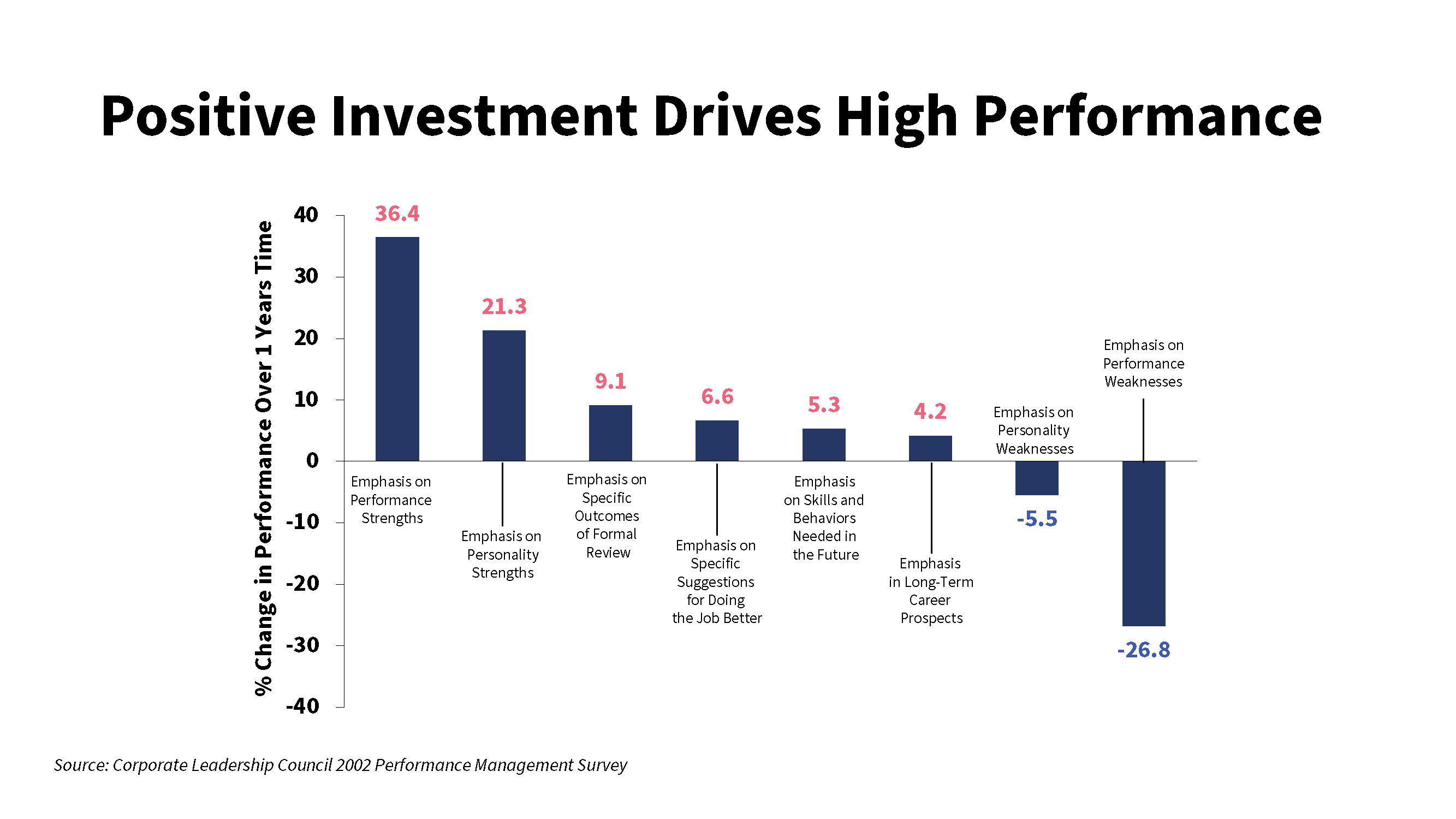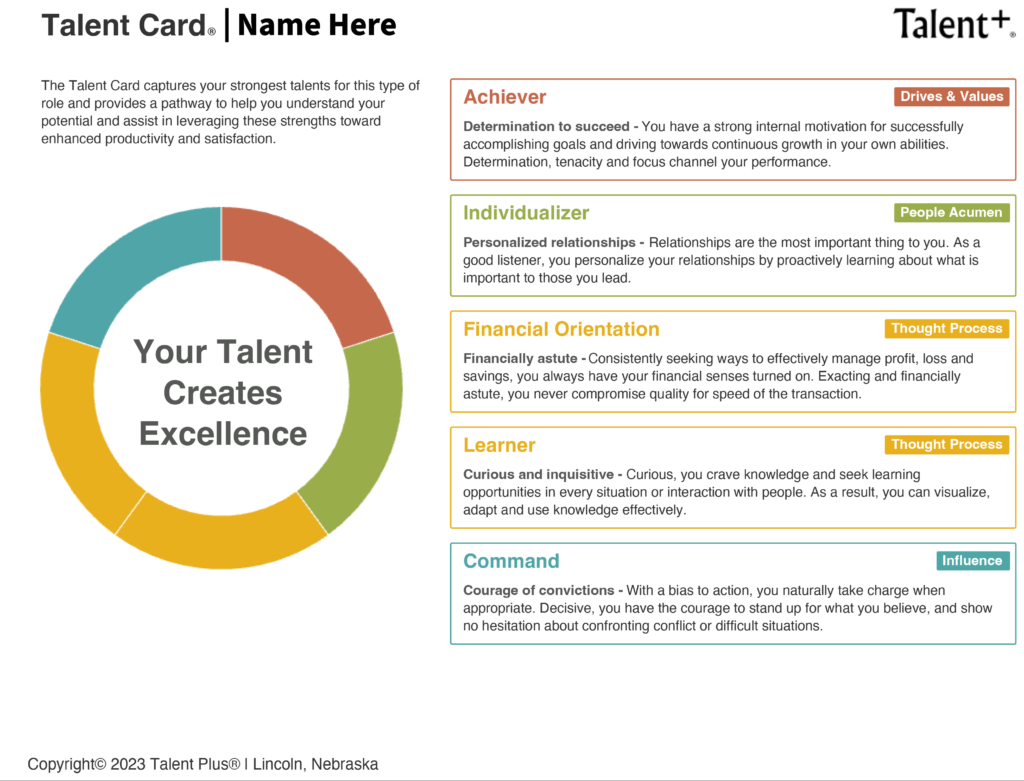
It’s an age-old adage: Put your own mask on before you help those around you. It’s true on an airplane, and it’s true in the C-suite. Much of the professional development within businesses happens below the executive level, but it doesn’t have to. Executive coaches can help uncover and leverage a leader’s strengths, so you have the tools to better develop and manage your team’s talents.
Identifying your natural abilities — not acquired through effort, education or experience — can help you be a better manager and consensus builder. Talent allows you to demonstrate your best. You don’t have to wait for it or get better at it to be able to move forward and continue the momentum of leadership.
It Starts at the Top
Executives can’t help teams understand their individual talents until they’ve first done the work to understand their own. But this isn’t a dance you go to alone. An executive coach is the perfect partner to help uncover those talents and leverage them.
Executive coaching is a tailored approach to leadership development, meant to pinpoint exact needs and offer constructive feedback. Paired with an expert in strength management, you’ll spend six months or more exploring your unique talents, setting and achieving your goals.
Coaching supports someone as they move from where they are today to where they want to go. The best client and coach relationships include executives who know what they want to do and are ready to get it done. Coaches help executives and top leaders move toward their goals.
Talent Cards, a Tool for Growth and Development
Talent Cards display the top five themes for a particular individual. These are patterns of thoughts, feelings and behaviors that are consistent over time. Talent Cards help identify:
- Work Style: How do you get work done?
- Drives & Values: What drives you?
- People Acumen: What kind of relationships do you create with people?
- Influence: How do you influence others?
- Thought Process: What is your nature?
Talent Cards have evolved over the years. (They used to be handwritten by an analyst!) Today, these cards are created electronically, still with a high level of personalization because each person has different talent intensities. With a strength-based approach, the talents highlighted on the Talent Card help executives and employees alike grow.
Interested in assessing your whole team for talents? Learn about using Talent Cards for employee development.
Focus on Strengths
A strength-based approach is particularly important. A 2002 Corporate Leadership Council survey examined the effects of an annual review focused on weaknesses vs. strengths. Focusing on weaknesses decreases performance by over 26%. Focusing on strengths increases performance by 36%.

Executives and employees alike learn better through positive reinforcement and leveraging talents.
Talent Card ® Example
Executive coaches can use Talent Cards to help you in a variety of ways. For example, imagine my themes are: achiever, individualizer, financial orientation, learner and command.

Referencing my Talent Card, a coach will know how it feels to work with me — that every detail will be taken care of, and that schedules will be right on. I’s are dotted and T’s are crossed. They’ll realize I am very goal-oriented, and that’s how I’ll lead my team. A coach will help me further develop my leadership strengths with personal goals created by the executive. Strength development makes all the difference in the world.
Talent Cards Don’t Dictate Coaching Sessions
Executive coaches don’t use Talent Cards to tell clients what to do or what they should work on. The clients dictate what they want to work on. It could be something with interpersonal relationships — with their boss or those who report to them. Or it could be more personal, like how to find more fulfillment in life outside of work.
Imagine you want to work on your relationship with your direct report who is extremely talented, but you do not communicate well. It takes a lot of effort and time to just explain something, but then once she gets it, she will do it thoroughly and is very dependable. An executive coach can use your Talent Card to help you work through the situation by leaning on your strengths.
Top Executive Talent = People Acumen
“People Acumen” themes are important for executive talents. If someone is less talented in People Acumen, they’ll need to learn strategies from their coach to compensate. As executives rise over the years, they develop closer business relationships. These relationships create trust and bring teams together.
My brother, who is retired now, was an architect. He was an executive at his firm in Boston. The two owners of the firm had no relational acumen. My brother worked there for eight years and one of the owners never even said hello to him! This isn’t ideal for leaders.
Many organizations are led through anger and intimidation, but that doesn’t work either. A leader without strong People Acumen will find it difficult to gain buy-in and trust from the rest of the team. Luckily, we’ve seen leadership trends change over the years to be much more open and inclusive. Successful executives can connect easily with and influence others — not by telling them what to do but by helping them understand the “why” behind it.
Talent Cards + Executive Coaching
When leaders develop their own talents, they become better at leading and developing the strengths of others. A Talent Card combined with executive coaching helps leaders objectively identify and leverage their strengths at work and home.
If you’re interested in connecting with an executive coach or want to utilize the power of Talent Cards, contact us for more information.
Talent Plus
Talent Plus is a team of industry experts who collaborate to deliver insightful and impactful content. Our blogs are designed to provide practical advice and fresh perspectives, helping you stay informed and ahead of the curve.
Latest Posts: Blog

Blog February 02, 2026
Managing Up and Down: Using Talent to Strengthen Every Working Relationship
Managing up and down is one of the most valuable skills you can have. Learn how understanding talent can make managing in both directions much easier.
Read More
Blog November 04, 2025
Top Performers, Explained: Karl Giuseffi’s Blueprint to Thrive
Explore insights from Karl Giuseffi on how talent science enhances workplace success and team performance.
Read More
Blog October 22, 2025
Practical Ways to Give Feedback That Strengthens Talent and Growth
Learn how to give good feedback that inspires and builds trust among your team while enhancing their natural strengths.
Read More
Blog September 25, 2025
What Do We Really Mean When We Talk About Talent?
Unlock the secrets of talent in the workforce. Learn how to identify inherent abilities for excellence in your team.
Read More
Blog July 08, 2025
How to Manage Difficult People
Master how to manage difficult people at work with six effective strategies for maintaining productivity and engagement.
Read More
Selection April 28, 2025
The Science of Talent Reduces Turnover in Credit Unions
Learn how Credit Unions use Talent Plus Solutions to decrease turnover, better engage employees and increase performance.
Read More
